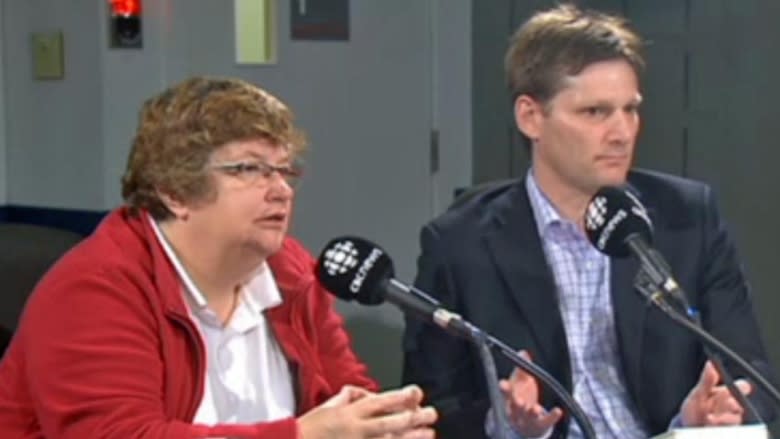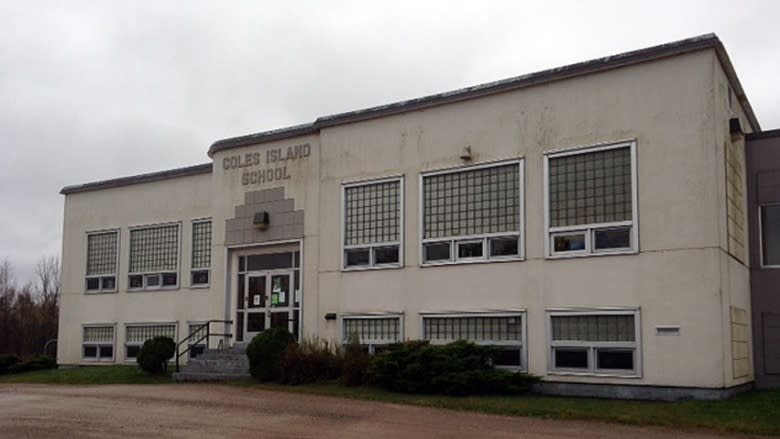Closing 2 schools in Anglophone West district 'just not right'
Schools in Bath and Coles Island are being recommended for closure by the district education council in Anglophone West School District, while the idea of consolidating Stanley High and Stanley Elementary into one school will also be considered.
The council made the announcement at its monthly meeting in Stanley on Thursday evening, identifying Stanley High/Elementary School, Bath Middle School and Coles Island School as facilities to be considered for closure.
Under the Department of Education's policy 409, there will now be a six-month period during which parents and others will be given at least three opportunities to talk about the prospect of closing the schools and challenge the decision.
Jane Buckley, the former chair of the district education council, called the situation in Stanley "unique" as the school building there houses a high school and an elementary school.
"I guess it's two staffs, two schools, two numbers, two budgets, two of everything," she said.
"We are going to do a study to see if it's time to make that one — a K-to-12 school."
Bath Middle School has approximately 40 students in grades 6 through 8. Coles Island School is a K-5 school and has approximately 30 students.
Schools are funded per student, so with fewer students, there is less money from the Department of Education budget.
Bath Mayor Troy Stone said the immediate reaction to the news in his community is negative.
"It has been, `Look, tell me where the next meeting is, we'll bring a bus load.'"
Stone notes Bath lost its hospital when the Upper River Valley Hospital opened in Waterville.
"Frankly, we've already paid our dues to help the province of New Brunswick's balance sheet," said Stone. "This is another hospital to us."
Coles Island School, which started as a high school, and became a middle and elementary school combined, has faced the prospect of closure before.
But Robert Aubin, who attended the school, thinks it offers advantages worth saving.
"Smaller classrooms, better learning opportunities for all the students, more one-on-one time with all the teachers for everyone, so I think it's good to have smaller schools," he said.
'It's just not right'
Coles Island resident George Evans says the older students already travel an hour to go to school. But he and others worry about sending the young ones.
"Our kids have to go to Chipman, which is a long trip for them. Leaving early, and getting back late, it's just not right," said Evans.
His granddaughter Jamie lives in Cambridge Narrows. But she empathizes with Coles Island students.
"For the kids that are around here, I think it would be good keep it open, because all the kids would have to go somewhere else, and it would be a long bus trip," she said.
"I wouldn't really like it, because it would be a long time before you get home."
Ross Wetmore, the Progressive Conservative MLA for Gagetown-Petiticodiac, thinks a way can be found to keep open Coles Island School in his riding.
He wants a meeting with the district superintendent.
"When you're in rural areas you've got to look at more than just the number of students. And I think what we've got to do is find a way to utilize schools for more than just for education," said Wetmore.
"There could be all kinds of possibilities that we may be able to use that school for. Maybe we'll be able to encourage the new government to move a sub-department into Coles Island," he said.
"That's what we'd love to see. Part of rural job creation."
Superintendent David McTimoney said more than school population is looked at when schools are identified for possible closure.
In the Coles Island and Bath scenarios, enrolment, the functional capacity of the schools, demographics and the average cost per student of running the facility will be considered.
"We're studying the sustainability," he said.
"I know that the word school closure can certainly bring out a lot of emotion among people, especially in those particular communities."
Decision rests with minister
Under policy 409, the minister of education makes the final decision on whether to close a school.
Education Minister Serge Rouselle said all things will be considered.
"Obviously we have to look at the economy of the area of the province," said Rouselle. "We spoke a lot during the election about infrastructure so we want to make sure that the infrastructure we have is good for a long time in the province.
"So we'll look at all the different aspects then we'll make a decision," he said.
"We have to take the decision for best interests of the community and of the province."
If closures are ultimately approved, they could happen before the start of the 2015-16 school year.



